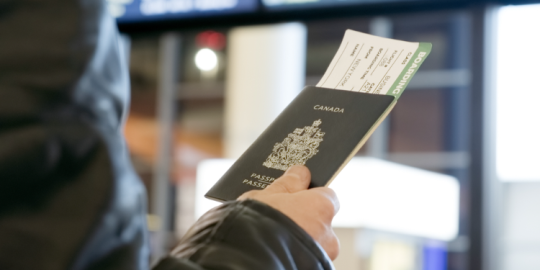Things you need to consider before moving abroad without a job
You've heard of "cheap relocation". You've perhaps tried "The cheapest cities to move to" or "Making a career abroad". Now you're taking the challenge one step further and aiming for relocating to a new country without working. But you know that moving abroad, most of the time, goes hand in hand with "visa": work visas, student visas, etc. What would be your status in your host country? But in your case, the first question to ask would be: how can you live abroad without working when you know that work is the primary traditional source of income?
How much do you need to live abroad without working?
The health crisis and, above all, inflation have led to a proliferation of testimonials and advice from young annuitants. They are under 40 and claim to be able to live without working. And they are not gambling or playing poker to become millionaires. They are talking about a plan to achieve their goal of enjoying life without working, at home or abroad.
But how much do you actually need to live in a foreign country without working? In your case, where are you considering a move, and what is the cost of living in that country? Are you aiming for a long-term move to a single country or several stays in different countries? What will your lifestyle be like?
Far from the millions estimated by most people, “l'Observatoire français des inégalités” estimates that a single person can consider himself well-off as from 3,762 euros per month. Wealth management experts even reckon on 1,630 euros a month to "live decently". They nevertheless point out that a life without work cannot be planned without considering the capital.
What is your budget?
This is what will make the real difference. Experts note that people with higher salaries and assets need less income to live without working. Conversely, low-income earners are quick to count in their millions. Still, these figures need to be put into perspective with the desired lifestyle.
How did the idea of moving abroad without working come about? Have you been planning about it for a long time? Do you have any capital? To stack the odds in your favor, start by assessing your sources of income: your job, any rents you might receive, property assets, income from stock market investments, etc. Also, assess your debts: do you have any outstanding loans? Of course, we recommend that you clear your debts before embarking on such a project.
You should also keep in mind that inflation may force you to get your calculator. With an inflation surge, a million today will not have the same value tomorrow. The amount you think you can live on decently without working may not be enough in the medium or long term. Finally, you will need to set aside a few million dollars to guarantee a safety net for yourself.
To move abroad... you have to work
You have to start by finding the money somewhere. Unless you are heir to a wealthy family or already living off an annuity, you will find it difficult to build your project without an initial source of income. The options set out below should not be taken independently but can be combined. It's better to multiply your sources of income and, as the saying goes, not put them all in the same basket.
Save on everything
The first option for moving abroad without working is to work while reducing your expenses as much as possible. Save money wherever possible. Put a halt to holiday plans and limit your leisure activities. However, it's hard to say whether you'll reach your goal before you retire. It all depends on your salary. High earners are mathematically more likely to make savings. But such an endeavor is not just meant for high-income earners, according to the numerous testimonials from young pensioners.
Invest in real estate
That's the secret of young annuitants: investment, starting with real estate investment. The project may seem contrary to your objectives since you will initially be going into debt to finance your investment. You have two options: investing in physical property and/or on-paper property. Physical property is the property itself. You effectively become the owner of a property.
On-paper real estate involves investing in a real estate investment trust (Société civile de placement immobilier - SCPI). This system allows you to buy and manage your rental property through a collective investment. The advantage of SCPIs is that they are accessible for a small amount (around a hundred euros/dollars) and offer an attractive return. Young people are more likely to opt for this solution, which also has the advantage of "working on its own". Once you've bought a property, the SCPI takes care of selecting it, finding tenants, and collecting the rent. But it's up to you to keep track of your investments and make your returns. All investments carry a risk, even if, like SCPIs, they are not listed on the stock exchange.
Invest in the stock market
Investing in the stock market guarantees a higher return more quickly. The risks are also greater. This is not about being a reckless gambler but about analyzing the market carefully. Educate yourself. Above all, don't invest on the basis of an obscure advertisement you see on the Internet. Diversify your portfolio. Keep an eye on your investments. If you are targeting the global market, find out about ETFs (Exchange Traded Funds). Also known as trackers, ETFs are investment funds that try to replicate the performance of a stock market or sector index. Again, investing in ETFs has advantages (simplicity, lower costs, etc.) and risks (your capital may rise or fall).
Become an influencer
Alongside the traditional solutions, more original ones have emerged. The profession of influencer didn't even exist a few years ago, but today it's part of the landscape. If you want to travel the world (by boat, since it's more environmentally friendly), why not become an influencer? Some monetize a skill they already have. Others turn their life project (living abroad without working) into a job in itself: they film their adventures, hoping to attract an audience and brands. The sector has rapidly become a professional one, to the point where companies are offering training courses on how to become an influencer and manage your career.
But it all starts with the project. What do you want to talk about? To generate income (which they hope will be quick), some people opt for the most high-profile and lucrative sectors, such as fashion, sport, nutrition and beauty. But they still need to gain their audience and build up a network. It's worth noting that companies don't just look at the big influencers. They also look up to smaller influencers who are able to attract more loyal followers.
But don't forget that, like any other profession, you'll need to know your field inside out. A sports influencer who has never done any sports won't progress much. Being an influencer also requires other skills (video editing, marketing, accounting, website design and management, writing, social network management, etc.).
Offer online training courses
With the boom in e-learning, the sale of training courses over the Internet is booming. Several young income earners have entered this market, offering training courses so that they can live without working. But again, be careful: as in the influencer business, anyone can sell an online course. This accessibility multiplies the number of competitors and requires you to be a real expert in your field. If you're selling an accounting course, it's assumed that you're an accountant yourself. Selling a course in which you know nothing is a scam that could put you off your moving abroad plans for a long time.
More tips for moving abroad without working
You can move overseas without working if you have the budget to do so and are well-prepared for your project. If you are not planning a long-term stay, you can take advantage of visa exemptions for short-term travel. But if you want to immigrate permanently, learning about tax residency, bilateral agreements, and asset management is important.
Remember that before you consider a life without work, you will first need to restyle your life as much as possible to save money. However, this solution may not be enough to provide a work-free life in a foreign country. In that case, consider working part-time as a compromise.
















